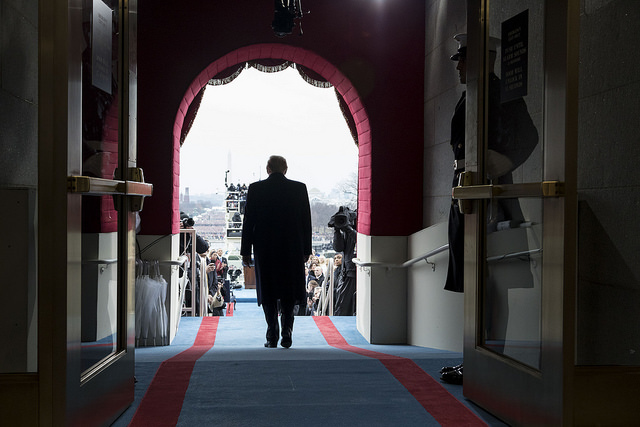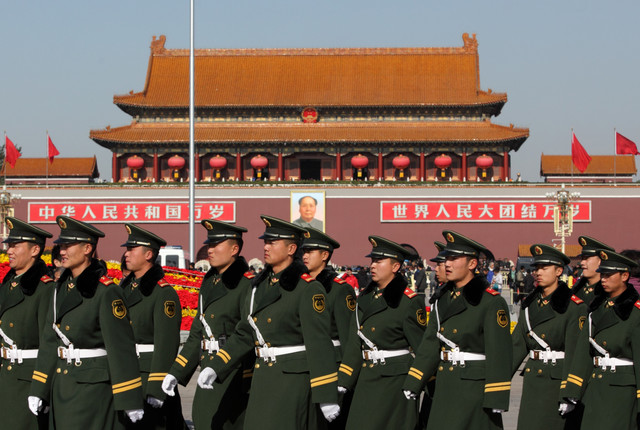‘Why Did You Wait?’: Moral Emptiness and Drone Strikes
Last week, the Washington Post reported a disturbing anecdote about President Trump’s visit to the CIA on his first full day in office:

Published by The Lawfare Institute
in Cooperation With

Last week, the Washington Post reported a disturbing anecdote about President Trump’s visit to the CIA on his first full day in office:
[W]hen the agency’s head of drone operations explained that the CIA had developed special munitions to limit civilian casualties, the president seemed unimpressed. Watching a previously recorded strike [in Syria] in which the agency held off on firing until the target had wandered away from a house with his family inside, Trump asked, “Why did you wait?” one participant in the meeting recalled.
Trump also requested that the CIA return to conducting drone strikes itself within Syria rather than only collecting intelligence to pass to the Pentagon to conduct strikes.
The president’s question—“Why did you wait?”—is not surprising. It is, after all, entirely consistent with Trump’s campaign-trail statement that battling suspected terrorists requires “tak[ing] out their families.” But it is nevertheless a jarring reminder of what former FBI Director James Comey termed the “nature of the person” who occupies the Oval Office.
I’ve written at length about the pains taken by President Obama to present himself in relation to the targeted killing program as a kind of philosopher-king: an anguished just-war theorist who deeply felt the weight of each death he caused, even as he understood those deaths to be necessary to protect his country. At its best, this self-understanding made clear the real costs of violence and emphasized the moral seriousness of the office of the presidency. At its worst, it came close to a theatrical fetishization of the president’s troubled conscience and obscured serious questions about transparency and accountability.
Trump presents somewhat of a different problem. He is not a person overly burdened by moral seriousness. Obama declared that civilian casualties incurred by U.S. forces abroad “will haunt me … for as long as I live.” Trump demanded during his campaign that civilian relatives of ISIS fighters be targeted as a matter of policy; this anecdote, assuming it’s true, suggests that this wasn’t mere campaign rhetoric. At a minimum, he seems on his first few days in office genuinely not to understand why anyone would “wait” to minimize civilian casualties. Similarly, Obama wanted the public to understand that he was personally accountable for each act of violence. Trump absolved himself of guilt after the death of Navy SEAL Ryan Owens in a covert mission in Yemen, passing the blame onto military leadership: “They lost Ryan.”
To be clear, there is absolutely no indication that the CIA or the Pentagon have made any moves to implement Trump’s proposal to “take out their families”—which would represent intentional targeting of civilians not engaged in active hostilities and would constitute a war crime. Some constraints have indeed been loosened: the New York Times has reported that the president has amended the Obama-era Presidential Policy Guidance (PPG) on targeting procedures outside “areas of active hostilities,” maintaining requirements for “near certainty” that no civilians would be killed but lowering the standard from “near certainty” to “reasonable certainty” of the intended target’s presence. But the PPG is an additional policy constraint on top of the laws of armed conflict and it would not have applied to the strike shown to Trump by the CIA, as both the Trump and Obama administrations have defined Syria as an “area of active hostilities” outside the scope of the PPG. Moreover, while reporting from the Wall Street Journal indicates that the CIA has indeed returned to conducting strikes itself within Syria, as the president requested, Bobby Chesney has examined why this might not be as big a change—or cause for concern—as it might initially seem.
More relevant for present purposes is the Trump administration’s decision to reduce the scope of the PPG’s application. The New York Times reported in March 2017 that the president had designated certain provinces of Yemen as areas of active hostilities and was set to do the same with areas of Somalia—essentially relaxing constraints on U.S. use of force from the higher standards of the PPG down to the standards required under international law and the rules of engagement.
As the Times noted, removing regions from the scope of the PPG lowers not only the applicable targeting standards but also the degree of White House and interagency deliberation over a potential strike. The PPG as designed under Obama was notable precisely because of the unprecedented degree of presidential involvement in lethal targeting operations: Benjamin Wittes described the document as “writ[ing] … into policy” Obama’s moral anguish and his sense of his individual responsibility for strikes. In contrast, U.S. News has reported on worries inside the Pentagon that the Trump White House’s effort to limit the scope of the PPG stems from the president’s desire to “escape blame the next time an operation goes wrong.”
This is the nub of the problem. From the Trump administration’s perspective, there may be perfectly good policy reasons to limit the scope of the PPG (again, operations outside the guidance are still bound by the Law of Armed Conflict, or LOAC). But when the executive branch is run by a man whose response to being shown a successful effort to reduce civilian casualties is, “Why did you wait?” it’s hard to shake the worry that policy is being driven not only by prudential concerns, but also by a moral emptiness in the White House and an unwillingness to recognize or shoulder the responsibility of killing.
For the moment, it’s impossible to say whether Trump’s lack of moral seriousness has had practical effects on American use of force abroad. What should be clear is that Trump’s inability to convey moral seriousness is a hole at the heart of his presidency. The fact that it is reasonable to ask whether the president’s one-time desire to commit war crimes has shaped U.S. targeting procedures is profoundly concerning even if the answer turns out to be “no.”
To put it another way, the moral void behind the question, “Why did you wait?” is in itself a failure of leadership. And though there is plenty to criticize about Obama’s seriousness as a philosopher-king, his presentation of moral reflection had a valuable role to play in reassuring both the American public and U.S. allies that he would never have asked that question in the first place.
We want to believe that those with the power to do great violence are also capable of great grief. Even when they are, that grief is not sufficient as a check on violence or a justification of its use. But the absence of grief poses its own concerns.





